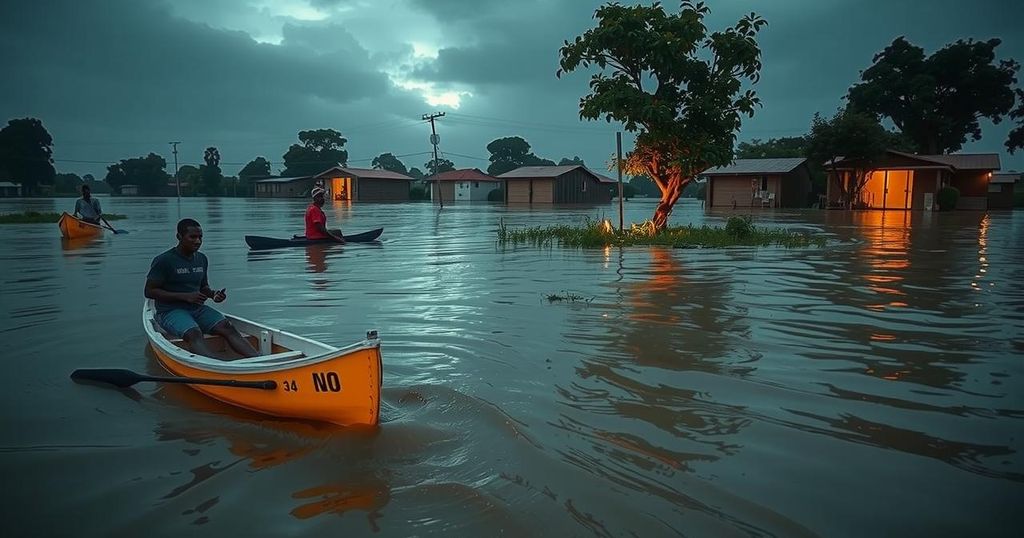Severe Flooding Exacerbates Health Crisis in South Sudan; WHO Responds
South Sudan is facing unprecedented flooding, affecting over 226,000 people and exacerbating a humanitarian crisis linked to climate change and existing health vulnerabilities. The WHO is actively responding by distributing emergency health kits and coordinating services amidst rising health threats, including cholera and malaria.
South Sudan is currently experiencing some of the worst flooding recorded in decades, resulting in widespread devastation across numerous regions. As of October 4, 2024, over 226,000 individuals have been displaced, with significant impacts on homes and livelihoods as essential infrastructure, including roads, become submerged. The floods have affected 42 out of the 78 counties, inundating 58 health facilities and making nearly 90 others inaccessible; principal roads connecting to the capital, Juba, have also been cut off, impeding access to vital health services. Approximately 890,000 individuals residing in flood-affected areas have been impacted, deepening an already critical humanitarian crisis exacerbated by climate change. The flooding has compounds ongoing health challenges, as South Sudan hosts approximately 800,000 refugees who have fled conflicts in neighboring Sudan. A rise in malaria cases has been alarming, with reports indicating over 120,000 cases and 31 suspected fatalities as of September 29, 2024. Additionally, Renk County has identified two suspected cholera cases, while a troubling increase in snakebite incidents has been recorded. In light of this public health crisis, the World Health Organization (WHO) has committed to working in collaboration with the Ministry of Health and various partners to provide essential health services and address the growing humanitarian needs. Dr. Humphrey Karamagi, WHO Representative in South Sudan, emphasized the vulnerable state of affected populations: “People are in a heightened state of vulnerability due to multiple shocks. WHO is committed to work with the Ministry of Health and our partners to ensure that they have access to essential health services continue while also prioritizing the response to growing humanitarian and health needs.” To aid the flood-affected communities, WHO has distributed approximately 88 metric tons of emergency health kits to key locations such as Renk, Bentiu, Malakal, and Bor. These supplies are intended for the treatment of over 870,000 individuals and contain crucial medical supplies necessary for addressing the immediate health threats. Furthermore, WHO has facilitated the distribution of nearly 1,300 malaria kits since January 2024 and has pre-positioned cholera investigation kits and rapid diagnostic tests to respond effectively to potential outbreaks. In conjunction with the Ministry of Health, WHO is initiating measures to assess the growing health situation, particularly focusing on vector-borne and water-borne diseases. Comprehensive efforts are underway to monitor health impacts within affected regions. On a broader scale, WHO is advocating for the development of climate-resilient health systems across the African region to tackle the emerging health threats posed by climate change. The organization emphasizes the need for formidable legal and operational structures to confront the direct and indirect health vulnerabilities attributed to climate change, thereby planning for adaptation and mitigation strategies to safeguard health systems.
The floods in South Sudan have occurred during the annual rainy season, typically lasting from April to November, but the severity of flooding has increased markedly due to climate change. This crisis is compounded by South Sudan’s ongoing struggles with humanitarian issues, including high levels of displacement from conflicts in neighboring regions. With many areas rendered inaccessible, the subsequent impacts on health care and infrastructure have reached alarming levels, threatening the well-being of millions.
In summary, the acute flooding crisis in South Sudan has led to severe humanitarian and health challenges, compounding existing vulnerabilities among the population. WHO’s proactive response, including the provision of emergency health kits and coordination with national authorities, aims to mitigate the effects of this disaster while sustaining essential health services. Continued efforts are required to build resilient health infrastructures capable of withstanding both current and future climate-related threats.
Original Source: www.afro.who.int




Post Comment